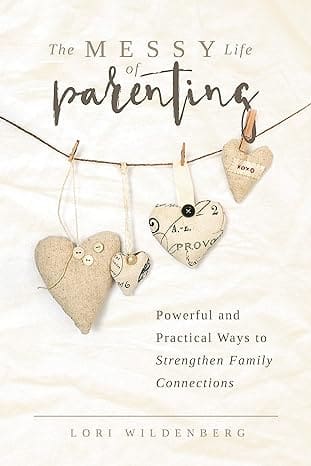
The Messy Life of Parenting
 Excerpt taken from The Messy Life of Parenting: Powerful and Practical Ways to Strengthen Family Connections by Lori Wildenberg
Excerpt taken from The Messy Life of Parenting: Powerful and Practical Ways to Strengthen Family Connections by Lori Wildenberg
Chapter 4
Conflict Doesn’t Mean Separation
Be kind and compassionate to one another, forgiving each other, just as in Christ God forgave you (Ephesians 4:32).
One summer we attended a family reunion in Holden Beach, North Carolina. There were nine families represented. The house burst at the seams with little kids, teens, college kids, parents, and grandparents. Adult conversation overtook the upstairs family room while the recreation room, a floor below, was the third generation’s hangout.
One evening in the upper room, the topic of faith was broached. Those participating in the discussion were an agnostic, an atheist, and a couple believers. The dialogue was so full of energy that my seventy-five-year-old mother-in-law put a stop to it. She scolded her fifty-year-old son and the rest of the “boys.” Even though the people involved were all comfortable with the spirited conversation, those of us on the periphery of the debate felt uncomfortable.
Many of my husband’s family members are at ease stating opposing opinions and beliefs. They are not at all troubled when conversations get intense. They don’t shy away from hot topics. In fact, they press into them.
This type of conversation isn’t my idea of a good time. I experience discomfort when a debate gets rolling. Yet it is a great example of how to present various points of view while keeping the relationship intact. A disagreement on principles does not mean lack of acceptance of a person. Often we don’t see eye-to-eye with those we live with and love.
Words can draw us together or they can divide. What we say and how we say it makes a difference. If we truly want to connect with each other on a healthy interdependent level we should be able to talk about the taboo topics of politics, religion, ethics, and money without the fear of relational disintegration.
When watching a political debate, it is clear there is little regard for the relationship. The focus of the forum is to win. Sarcasm, name-calling, interruption, talking over, lack of listening, and domination are all ways one can be heard, but it comes at a cost. An intact relationship may not matter in the political arena, but in the family a damaged or broken relationship is a high price to pay.
Respect is the missing ingredient in many political debates. Discussions based on respect for each person demonstrates the relationship is valued more than the issue being discussed.
Antisocial
Social media is not the place for our kids to learn how to discuss issues. Many apply a similar approach to that used by politicians—only worse. Internet “trolls” hide their identity but display cruel and condescending messages publicly. Others boldly and rudely speak their mind with the intent to offend and do harm. These people have never learned how to effectively communicate their point of view without using a personal attack. When this occurs it is totally OK to remove their comments, unfriend, or even block.
“I think you should block him,” my sister once advised me as to how to respond to an individual who made negative and argumentative comments on my personal Facebook page.
Keri continued, “Let me ask you, why are you on Facebook?”
“For business and social reasons.”
“Does this person’s actions help or hurt those goals?”
“His comments are antagonistic, condescending, and divisive. He hurts my objective.”
“What would you do if you didn’t know this person?” Keri pressed further.
“I’d immediately block him.”
“I think that’s your answer.”
My sister helped me clarify my purpose, goals, and desires. I have taken control of my social media by setting clear boundaries. Comments must be respectful or they will be removed.
Boundaries
Boundaries are created from convictions and conscience. They are for the person setting them. They are not meant to encourage relational alienation. Interdependence isn’t boundary free. It may allow for compromise or it may not.
Libby, a mom of an adult daughter, shares her experience with boundary setting. “My daughter and her live-in boyfriend were coming to visit. I struggled with how to approach the sleeping arrangements. Is it ridiculous to separate them since they live together? I decided it was important to me to maintain integrity by standing by my conviction that only married people should share a bed. I decided to let my daughter and her boyfriend know they were welcome to stay but they would need to sleep in separate quarters.”
In an interdependent family or friend relationship, sometimes we don’t agree. Interdependency doesn’t equal unconditional support. It does mean unconditional love. Contrary to the notion the current culture professes, we don’t have to agree in order to love one another. The principle and the person are not to be responded to in the same manner. We accept and love people; we agree or disagree on principles. In Luke 6:32, Jesus said, “If you love those who love you, what credit is that to you? Even sinners love those who love them.”
It can be a little surprising and sometimes disconcerting for parents of young adults who have begun to formulate, articulate, and then act on their ideas. But it is possible to disagree on principles while still loving the people who hold thoughts, beliefs, and ideas different from our own. It is simple but it is not easy. Parents need to set the stage for healthy conversation.
Discuss or Debate
The ability to discuss rather than debate requires the establishment of ground rules. Each person is entitled to his or her opinion and belief. Ridicule, sarcasm, and domineering are not allowed. To have a respectful exchange we must present convictions concisely using logic rather than emotion while avoiding long-winded lectures. Instead take turns, listen, then consider the other person’s opinion. Try to seek common ground. Find the golden nugget where you can agree. In a close connected family it is to be expected that there will be opposing points of view. We can disagree agreeably.
Here are five rules of engagement for hot topics:
- Know the facts.
- Speak out of your head, not your emotions.
- Always maintain respect.
- Listen for understanding.
- Avoid attempts to convince or coerce. (Those are debates, not discussions.)
If it is an impossible task to implement the five rules of engagement, it may be best to avoid hot topics like religion or politics. The way we speak and the words we say will echo in our kids’ heads, just like our parents’ voices are heard in ours.
Grow a Conscience
Differing points of views, beliefs, and experiences can create conflict. The knowledge of conscience development gives perspective on where the other person is coming from.
Our kids need parental help and supernatural intervention when it comes to growing a conscience. To keep the moral compass of the conscience functioning properly, the Holy Spirit must be involved.
Without the influence of the Holy Spirit, the conscience will fall back on emotions to dictate good and bad, right and wrong. The idea of, “It feels right so let’s do it,” or, “Let your heart tell you what to do,” are statements of an underdeveloped conscience—one without the Holy Spirit. Sometimes, oftentimes, doing the right thing doesn’t feel good and is typically inconvenient.
I have surmised there are six phases of conscience development. These phases shed light on how loved ones deal with conflict and resolve problems.
Phase 1: Infancy
“If it hurts, it’s bad. If it feels good, it’s good.” (Being hungry is bad because it hurts.) With babies, this is the time to build trust by responding to their needs. If one is spiritually in the infant stage he may say, “Because it feels so good when I’m with you, I know it’s OK to have sex with you.” The conscience in this case is emotions-driven. It’s right if it feels good.
Phase 2: Toddler
“Hitting is bad because I get into trouble.” Behavior is good or bad depending on the consequence. With toddlers this is the time to establish acceptable and unacceptable behavior, rules, and consequences. An adult in the toddler stage of conscience development may say, “I won’t have sex with you because I could get pregnant.” This stage is obedience-driven. It’s right if it follows the rule or the law.
Phase 3: Preschool to Seven Years Old
“It’s wrong because my family doesn’t do it that way.” With this age group, this is the time to talk about “Team [last name]” and establish family unity and identity. The Golden Rule can be applied at this phase. This is the age of “Why” and the perfect time to begin in earnest talking about family values, morals, and faith. An adult at this spiritual phase may say, “I go to church because that is what people in my family do.” (Those who have failed to connect bounce back to phase 2—the toddler phase—and say, “If I do it and don’t get caught it’s OK.”) Conscience is tradition-driven. “It’s right because that’s how I was raised.”
Phase 4: Intermediate Ages
“It’s right if it’s equal.” At this stage kids realize mom and dad are not perfect. They are keenly aware of fairness. “That’s not fair.” With the intermediate age group this is a great time to say, “I’ll do this, if you do that,” establishing more family responsibility and reciprocity. Spiritually speaking, someone at this phase may say, “God, why does this happen to me when I do this for You?” Shoulds and shouldn’ts are evident in this person’s vocabulary. A “What’s in it for me,” even-steven mentality. This stage is fairness-driven.
Phase 5: Preteen to Teen
“Kids my age always [fill in the blank]. That’s what we do.” People pleasing can also be a part of this phase. “I will do [fill in the blank] to be accepted.” In this phase it is good to ask questions to get kids thinking so they can see if the decisions they are making are solid ones or are peer pressure driven. This stage is driven by the culture. It’s right if the culture says it is.
Phase 6: Mature
“It’s right because God says it’s right.” A healthy, mature moral compass is one where thinking, feeling, and acting with empathy and compassion lead a person to do the good and right thing—just because it is good and right. Right thinking, feeling, and action occur in spite of good or bad feelings, rules (laws), tradition, fairness, or society. This stage is driven by a higher power. God and His Word set the moral standard of right and wrong.
To reach phase six we must let our kids know they are unconditionally loved by us and by God. They need to embrace the truth that God’s Word helps us all live well.
Empathy is fostered when kindness and respect are demonstrated in our homes and is a critical component of conscience development. When we listen to our kids, set limits, follow through with consequences, teach responsibility, not allow for aggressive talk or actions, and avoid rescuing them from sadness, discomfort, or failure, we can influence healthy conscience development.
When we train our kids to live for the Audience of One, they are free to make decisions that may be counter-cultural, which is a courageous thing to do. When they look to God rather than man they will be ready to hear His still small voice over the dull roar of the masses. By helping our kids grow a Holy Spirit-driven conscience they will be mature, wise, loving, and discerning people who honor God with their thoughts, words, and deeds.
My conscience confirms it through the Holy Spirit. —Romans 9:1
The Thinking Mode
Lots of parents steer clear of kid disagreements. Their intention is good. But “let the kids figure it out themselves” is a survival-of-the-fittest approach. Without proper training, the weaker or younger individual is metaphorically consumed by the older, stronger, or more cunning sibling.
We don’t want to fall to the opposite extreme either, playing the role of judge or referee. When we insert ourselves into the equation we set the stage for triangulation, a situation where we become the third party to a conflict between two people. We need to train our kids to directly and constructively address conflict without mom and dad managing the disagreement or relationship.
The first thing to tackle is the emotions stirred by conflict. For kids to self-regulate they need to move out of the emotion-driven limbic system to the frontal lobe where the reasoning part of the brain is found.
We can help them learn to reason during frustrating sibling moments by reminding the older sibling of the younger one’s age. Have the elder say to himself, “My brother is only [fill in the blank] years old.” Give the older child some empathy for the younger one. Scripture states, “When I was a child, I talked like a child, I thought like a child, I reasoned like a child. When I became a man, I put the ways of childhood behind me” (1 Corinthians 13:11). Children will act in childlike ways.
Train your children to pause, to wait, and then to wait some more. Delay the immediate reaction to fight or flee. The angry child may need to remove himself temporarily, “I need a few minutes to think about how I’m going to respond to this.” Help him out by saying, “I can see you are angry. Do you need to remove yourself so you can think about a helpful way to respond?” Scripture talks about responding slowly rather than reacting quickly. “My dear brothers and sisters, take not of this: Everyone should be quick to listen, slow to speak and slow to become angry” (James 1:19).
Encourage your kiddos to develop what I call a rage interrupter. Find a go-to reaction to implement that will refocus the mad. This moves the child out of the emotional and reactive limbic system to the prefrontal cortex where reasoning occurs. I close my eyes and do a silent scream in my head. This vision helps me find a little humor in the situation. Then I’m ready to reason rather than rage. James reminds us how our words can make us look like a hypocrite if we are unable to speak with temperance. “Those who consider themselves religious and yet do not keep a tight rein on their tongues deceive themselves, and their religion is worthless” (James 1:26).
Teach your child to define the emotion. When we can pinpoint our anger to its primary emotion (embarrassment, frustration, irritation) our brain is ready to deal with the problem at hand. In essence we are catching the thought and feeling while placing it in its proper box, “We take captive every thought to make it obedient to Christ” (2 Corinthians 10:5).
Once an outburst is avoided and the feeling named, the problem that triggered the anger needs to be addressed. When our kids become skilled at conflict resolution they are no longer threatened by a little adversity. These three steps help the individuals in conflict get to the solution side of the problem:
State what occurred, and use facts. “You took my bike without asking.”
State the concern. “I want you to ask before you borrow my bike.”
State the emotions created. “I feel disrespected and taken advantage of when I am not asked.”
These three steps identify and acknowledge the problem without using assumption or accusation. The angered person is able to honestly articulate his or her feelings. This approach moves the issue to a place that isn’t personal with the expectation that it can be resolved.
The next portion of the conflict resolution process is restoration. If you are the offender, restore the relationship by asking, “How can I make it better?” (Note: none of this applies to abusive situations. Get professional help if you are in an abusive situation.) On the flip side, when apologized to, accept the apology without rehashing the conflict. I admit, this can be difficult. At least it is for me. I confess it can take me some time to move to accept the apology and drop my need to state one more point. Thankfully Tom is able to move more quickly to restoration and resolution. He helps us get to the solution side of the issue.
This process may need some guidance or coaching. We want to avoid the role of director and protector. When we insert ourselves into the conflict, we become a barrier between the two people disagreeing. Kids need to be able to directly address each other without having mom or dad run interference. Parental support, encouragement, and instruction are what our kids need to learn the skills of respectful discourse.
Train your child to think of an alternative response to an angry display. Don’t remind the child how he or she reacted poorly the last time but give them time to think about and practice how to respond better the next time. Teach your child to retrain his or her brain to deal with frustrations using the new response rather than reinforce and rehearse the frustrated reaction in their mind.
Help your child to change self-talk. Rather than say, “I have a hot temper,” empower and train your child to say, “I am able to choose patience and kindness. I can demonstrate control.”
The mind governed by the flesh is death, but the mind governed by the Spirit is life and peace. The mind governed by the flesh is hostile to God; it does not submit to God’s law, nor can it do so. —Romans 8:6-7
Easily Offended
“She looks like she’s from another world.” The statement still resounds in my memory twenty-five years later. As you can see, I’m totally over it.
My four kids and I were seated at the Dunkin Donut counter following one of my kid’s well-checks. A sweet treat was the best medicine following a painful shot. The rude observation came from the male customer seated on the stool next to me. By this time, I had become accustomed to the bizarre things people say, “Your kids all look like they have different dads,” a fellow mom once observed as I dropped my little ones off at preschool.
Some people say really dumb things. My oldest child has jet-black hair and the younger ones have blond. I guess that gave people license to comment on my children’s looks. To both comments I said, “Hmmm.” I did not feel compelled to explain that we adopted our oldest. There was no need to engage further. (Later in the day clever comebacks flooded my brain. I wonder if God made me a little slow on the draw so I would be unable to wield the cutting words in the moment.)
Today there is a term for comments that are insensitive but where no malice was intended: microaggression. Wikipedia defines microaggression as “the casual degradation of any marginalized group” and as “generally happening below the level of awareness of well-intentioned members of the dominant culture.”
Microaggression is identified by the receiver’s feelings. If the person was hurt, even if the comment was not intended to harm, that is considered microaggression. In some cases folks who are accused of microaggression in the workplace are being reeducated and required to attend sensitivity training.
I believe we should raise our kids to be kind to all. We are all important and worthy in God’s sight. We ought to train our kids to have empathy for another. God uses this empathy so we can support others.
We have all put our foot in our mouth at least once. I have been on the giving and receiving end of microaggression. Most of us have been on both sides of the sensitivity/insensitivity coin.
When we are the receiver of the careless or clueless messages, we have an opportunity to show grace. This could be the time to educate those who mean no harm. Perhaps microaggressive comments are moments to ask: “What do you mean?” or say, “I know you didn’t mean to harm, so I’m going to show you a more a sensitive way to express your words.” If the heart of the person is in the right place, he or she will not mind and may appreciate a little on-the-spot education.
At the same time, we don’t need to be easily offended. We can deal with issues as they arise or choose to overlook the remarks. We can embrace the “That’s OK” mentality and not freak out but respond in a way that honors God.
My reaction to the aforementioned examples wasn’t the best. I didn’t engage well. Yet I didn’t overlook the remark either. I have harbored resentful feelings. Why would I give someone that power over me?
As our kids grow, kindness and empathy need to be taught and lived so they can learn how to demonstrate love to others. When our kids gain the understanding that sometimes people are uninformed or not versed in preferred verbiage, they will be able to respond with grace.
As a society, we have become overly sensitive and easily offended. When we have a big emotional reaction to another’s carelessly delivered message we are focused on ourselves not on God. Why not give people the benefit of the doubt? Why jump to offense? No one likes an insensitive bloke. However, it is also tough to converse with an overly sensitive individual.
We can put these things into perspective and learn how to deal with those who are not always so pleasant and may be a bit socially awkward. Let’s train our kids (and ourselves) how to love those who are insensitive and how to respond to unkind yet unintended comments with grace. The wise message from Proverbs 19:11 reinforces this thought. “A person’s wisdom yields patience; it is to one’s glory to overlook an offense.”
Blindsided
It is one thing to deal with microaggression from a stranger; it is quite another to address the unexpected actions of a family member.
“We never saw it coming…”
Two moms expressed this very sentiment to me just weeks apart. Each one’s world has been rocked by her young adult. In a minute, life went from pretty normal and non-eventful to nightmarish. Both had a daughter dabbling in behavior they never expected.
So what is a parent to do when life takes an unexpected turn? Keep living, keep loving, and keep praying. Allow the Lord to use you in drawing your child to Him. Respect the young person’s right to believe or live differently from you, expect the same consideration in return, and depending on the age and situation, establish appropriate boundaries.
We can still achieve the desired goal of interdependence within a relationship that doesn’t line up philosophically. Boundaries are the way that can happen.
If our interdependent relationship is built on mutual love and respect, we do not have to do anything that violates or is in conflict with our conscience. Ultimately we will need to stand before the Lord and give an account of how we managed the life He gave us.
Sin loves company. It desires to be justified, excused, rationalized, condoned, and even validated. Comments like:
“Everyone does it.”
“It’s my life. No one is getting hurt. What’s the big deal?”
“No one else has an issue with it. It’s even legal. Why are you against this?”
Parents do not have to be unwilling participants. Do not be cajoled into partaking in any activity or pressured into stating something that makes you uncomfortable or violates your conscience, convictions, or belief system—even if it is legal.
Loving our kids in the hard places stretches us. Think of a rubber band around your wrist. Wrap it too tight, and you’ll cut off your blood flow. Let it dangle loosely, and it falls off. So you must find the sweet spot, the place where the rubber band holds on but doesn’t break.
Respect is a key component when it comes to establishing limits. It goes both ways. “I treat you with respect, I expect respect in return.” Bridging the gap with respect and humility created by differing beliefs is worth the fight. If we want our children to be interdependent they must learn how to be respectful and proactive regarding conflict.
In Micah 6:8 it says, “He has shown you, O mortal, what is good. And what does the Lord require of you? To act justly and to love mercy and to walk humbly with your God.”
We can do the right thing while displaying mercy and being humble. Parents in interdependent relationships with their older children still have influence. In Matthew 7:1-5, Jesus tells us how to deal with difficult situations.
Do not judge, or you too will be judged. For in the same way you judge others, you will be judged, and with the measure you use, it will be measured to you. Why do you look at the speck of sawdust in your brother’s eye and pay no attention to the plank in your own eye? How can you say to your brother, “Let me take the speck out of your eye,” when all the time there is a plank in your own eye? You hypocrite, first take the plank out of your own eye, and then you will see clearly to remove the speck from your brother’s eye.
Jesus tells us not to address our brother’s sin without taking care of and making note of our own. We can discuss and correct if we speak truth with a humble heart. By doing things the Matthew 7 way we will be able to maintain an interdependent relationship.
Mercy Me
We will have a home that is filled with mercy and grace if it’s OK to spill and to make mistakes. Without understanding what it means to be wrong and wronged, forgive and be forgiven, we can never fully grasp grace. Conflict in relationship is an opportunity to learn mercy and grace.
New dad and counselor Kegan Mosier says this about mercy as it relates to parenting:
Everyone said that having children would completely change our lives. I now know this to be true. No one has thrown out an, “I told you so,” but if they did, I would humbly receive it. My wife and I went on a date this week and reflected on times gone by where we would take a day trip to the mountains to snowshoe for hours on end, spend a whole weekend skiing on the slopes, or take an entire Saturday to explore our city.
Things are different now. Although we still go to the mountains and explore Denver; adjustments have to be made for our baby, which can quickly change predetermined expectations and lead to frustration. Most parents, if they are honest, would agree that when the whining, temper-tantrums, screaming, and teething pains come, accessing mercy and patience can feel like grasping at straws. Momentarily, we internally lose it. Guilt attempts to make its assault on our mind. A warm wash of shame tries to cover us and convince us we are bad parents.
Parenting is a huge responsibility, accompanied with a sense of power that must be properly stewarded. I can only wield that kind of power with a heart drenched in humility. As parents, we are called to represent His character, His mercy, to our children.
Grace, mercy, and forgiveness are intertwined. Forgiveness pardons the offense. Mercy is not getting what is deserved for our actions or attitudes. Grace gives us what we don’t deserve in light of the offense. Jesus is our perfect example of these qualities.
Humility is the fear of the Lord; its wages are riches and honor and life. —Proverbs 22:4
…
Order your copy of The Messy Life of Parenting: Powerful and Practical Ways to Strengthen Family Connections by Lori Wildenberg
Trending Now
Sign up today for your Inspiration Today Daily Newsletter
Supercharge your faith and ignite your spirit. Find hope in God’s word. Receive your Inspiration Today newsletter now!
Lori Wildenberg
Lori Wildenberg, author, speaker, lead mentor mom at Moms Together Facebook community and group, co-founder of 1st Corinthians 13 Parenting Ministry, licensed parent and family educator, and parent coach is passionate about helping families build connects that last a lifetime. She's wife to Tom, mom to four, mom-in-love to four, and Mimi to one. Learn more at loriwildenberg.com
Related Articles
February 13, 2026
How to Find Joy in the Midst of Sorrow
Sorrow has a way of arriving uninvited—and staying longer than we expect. Loss reshapes our lives,…
January 30, 2026
What’s Happening to Your Family?
Families around the world are facing challenges that feel heavy, confusing, and unfamiliar. This…
January 14, 2026
How to Build a Stronger Marriage
When the same arguments keep resurfacing and distance quietly grows, it’s easy to feel stuck. If…
August 23, 2025
If God Is a Loving God, Why Is There So Much Pain in This Life?
Why is there so much pain in this life? This heartfelt article wrestles with that question through…
Next Steps To Strengthen Your Walk
Inspiration Today Newsletter
Supercharge your faith and ignite your spirit. Find hope in God’s word. Receive your Inspiration Today newsletter now!
Christian Articles
Find articles to strengthen your walk and grow your faith. We have a wide range of topics and authors for you.
Submit A Prayer Request
We are here for you. Simply click on the button below to reach us by form, email or phone. Together we will lift our hearts and voices with you in prayer.





